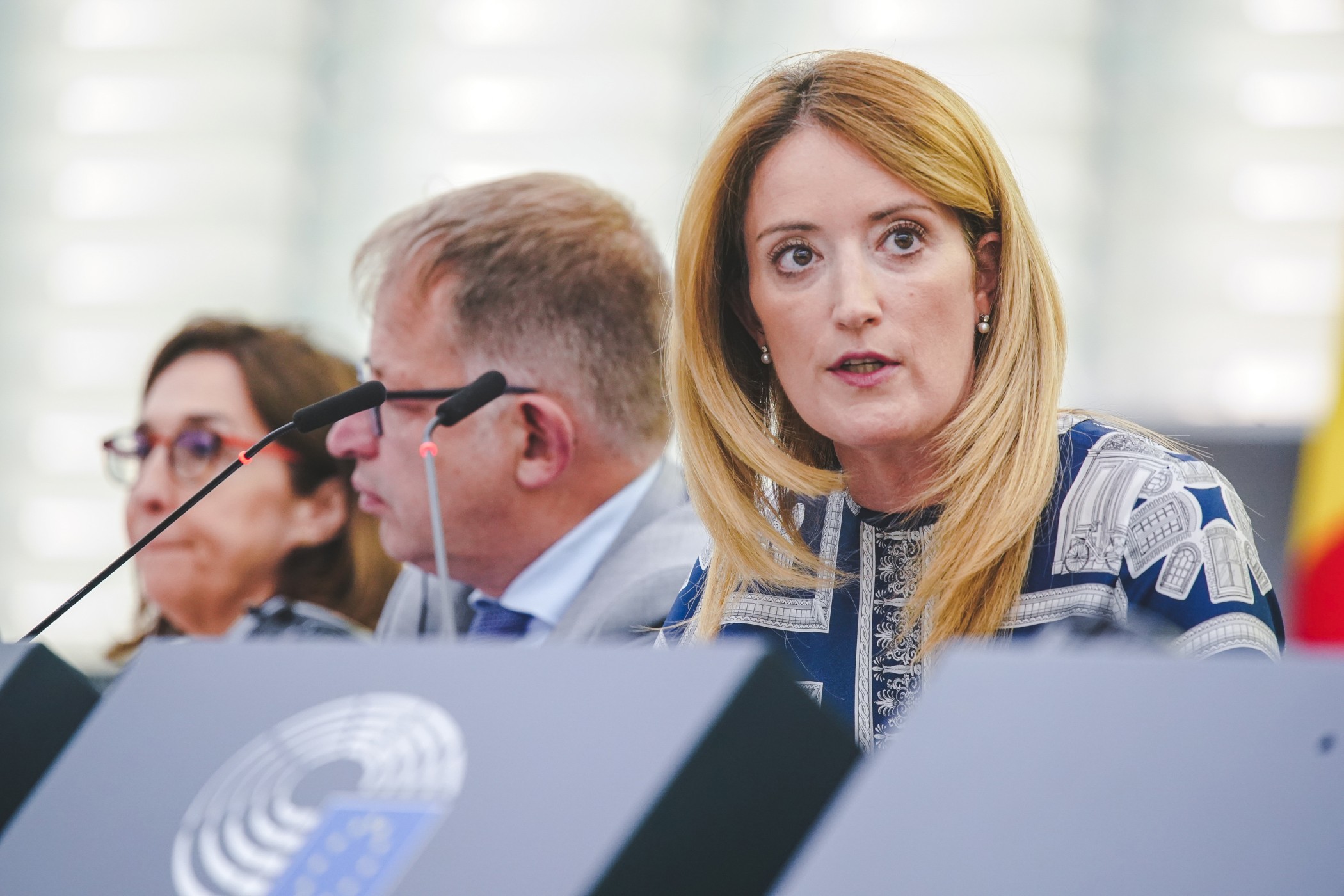Members of the European Parliament (MEPs) voted on Thursday in favour of a motion demanding that abortion be included in the EU Charter of Fundamental Rights on account that the right to “safe and legal abortion” constitutes one such fundamental liberty.
A response to the US Supreme Court’s recent overturning of Roe v. Wade, which put an end to 50 years of a constitutional right to abortion, the resolution denounces a “backsliding in women’s rights” as well as in Sexual and Reproductive Health and Rights (SRHR) overall.
The text urges EU lawmakers to recognise the criminalisation, delay, and denial of these rights as constituting “a form of violence against women and girls.”
“Women’s rights are inalienable,” the motion reads, “and they cannot be removed or watered down.”

The resolution text also inveighs against bans and restrictions on abortion as “disproportionally” affecting women in poverty, particularly women of colour, as well as LGBTQ+ groups, disabled people, adolescents, migrant people, and single-parent households headed by women.
As such, the text contends, any restriction on abortion and reproductive rights has “direct implications” for the effective exercise of the rights recognised in the Charter of Fundamental Rights, including “human dignity, personal autonomy, equality and physical integrity.”
The text passed with 324 votes in favour, 155 against and 38 abstentions – three days after lawmakers debated the fall of Roe and what it entailed for women and LGBTQ+ groups worldwide.
The non-binding resolution constitutes a symbolic gesture first and foremost, which, though it cannot progress into law, publicly reaffirms EU standing vis-à-vis abortion and reproductive rights.
But for all its symbolic weight, the resolution text, and the discussions that took around abortion rights, brought to light some very material schisms internal to the EU.
Poland, Malta, and other EU members accused of backsliding reproductive rights
In the resolution text, European lawmakers singled out member states for their restrictive and/or prohibitive abortion and reproductive policies, in particular Poland, which in 2020 reversed long-standing reproductive rights and set up a de facto abortion ban, as well as the Catholic island nation of Malta, where abortion is also banned.
Malta’s long-established opposition to abortion came into focus in January this year when Maltese MEP Roberta Metsola, who declared she was “categorically against abortion,” was elected president of the European parliament.

Malta came under renewed attack over its lack of abortion and reproductive rights last week when news broke that an American woman, Andrea Prudente, who had suffered a miscarriage, was denied treatment by Maltese doctors because the foetus’ heart was still beating.
The motion also points to the erosion of abortion rights in Italy where medical abortion training is drastically lacking, and an estimated 68.4% of gynaecologists identify as “conscientious objectors,” according to 2017 Italian Ministry of Health data.
The right to conscientious objection over abortion provides doctors and medical staff with the option to “consciously object” to performing abortion procedures on a patient on account of their religious or personal beliefs.
The so-called “conscience clause” also drew criticism on Thursday, June 23, when MEPs passed a resolution proclaiming that safe access to abortion is a human right, and further averring that the denial of the abortion procedure to a patient “on grounds of religion or conscience … endangers women’s lives and rights.”
The text also cited Slovakia for its ban on medical abortion in early pregnancy, as well as Hungary and Croatia where abortion care is being denied.
Lawmakers subsequently called for the European Commission and the member states to scale up their political and financial support for human rights defenders and healthcare providers working to advance Sexual and Reproductive Health and Rights.
Related articles: The Post-Roe Era Has Begun: What It Means for the US and the World | Fit for 55: EU Approves Greener Aviation Fuels
Concerns over the rise of radical-conservative and religious anti-abortion groups
MEPs also voiced their concerns that the overturning of Roe will embolden extremist anti-abortion groups and result in a surge in funding for “anti-gender and anti-choice groups in the world, including Europe.”
Prior to the vote, the far-right groups Identity and Democracy (ID) and European Conservatives and Reformists (ECR) filed two separate motions upholding a “right to life” for “every human being” and challenging the classification of abortion as a human right.
The two groups, together with some members from the centre-right European People’s Party (EPP), including its leader Manfred Weber, formed the opposition to the final resolution.
The opposition’s texts inveighed against what it perceived as an “inappropriate” interference on behalf of the European Union seeking to “delegitimise the jurisprudence of the US Supreme Court,” and called that the formulation and implementation of abortion policies fall exclusively within the legislative remit of the member states.
The latter clause echoes the US Republicans’ rhetoric downplaying the end of Roe as a mere shift in the balance of powers, which allegedly empowers the American people by enabling the states to legislate on abortion independently from the federal government.
“This debate is not about the defence of life, despite the claims of the anti-abortion movements,” said Soraya Rodríguez Ramos, a liberal MEP who co-authored the motion. “It is a debate about the freedom of women.”
At the end of June, MEP Samira Rafaela of the Renew Europe group shared a letter she and her team sent to the European Parliament President Metsola demanding that accreditation of “lobbyists linked to radical-conservative anti-abortion NGO’s” be withdrawn, and the groups excluded from Parliament.
President @EP_President Metsola has by now received our letter that requests to take away the badges of anti-abortion lobbyists. There is no room in the European Parliament for their toxic anti-women agenda. #RoeVsWade #AbortionRightsAreHumanRights #AbortionIsHealthcare pic.twitter.com/Q8aZUrtFQp
— Samira Rafaela (D66/Renew Europe) (@samiraraf) June 29, 2022
The letter cites a damning report published in 2018 by the European Parliamentary Forum for Sexual and Reproductive Rights on the transnational anti-abortion strategy entitled Restoring the Natural Order: an Agenda for Europe.
The report provides insight into the workings of increasingly powerful anti-choice groups driven by religious dogma and often linked to the Vatican, whose actions cover the whole of Europe.
Not only has the Supreme Court ruling emboldened such groups, but it legitimises its endeavour and risks earning them more financial and political support across European nations, particularly as far-right movements are currently gaining momentum.
Last month, for instance, the French far-right party Rassemblement National (National Rally, or RN), led by Marine Le Pen, won a record number of 89 seats in France’s national assembly, earning them a significant role as the main opposition force in parliament.
Le Pen’s National Rally is a member of the Identity and Democracy (ID) group, which authored one of the motions opposing the incorporation of abortion into the EU Charter of Fundamental Rights.
If the far-right groups’ endeavours fail in the European parliament, where today’s ruling was, again, symbolic in essence, the focus can now shift to national parliaments, where newly acquired political power provides embattled anti-abortion groups with every chance and means to push their agenda forward.
Editor’s Note: The opinions expressed here by Impakter.com columnists are their own, not those of Impakter.com — In the Featured Photo: MEPs vote by show of hands at the July plenary session in Strasbourg. Featured Photo Credit: European Parliament/Flickr.










